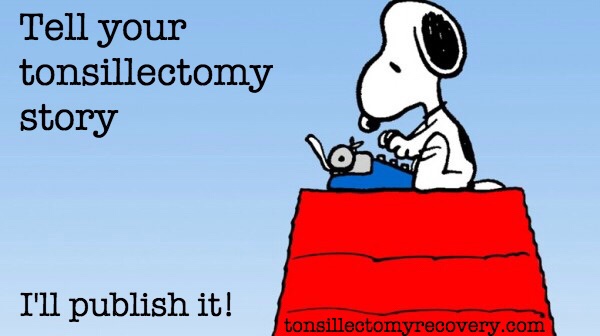am a 44-yr-old female with no history of major surgeries other than wisdom teeth removal. It’s been 9 days since my tonsillectomy surgery. The doctors told me that it would be an incredibly painful recovery. I believed them and tried to prepare myself for the worst. My idea of worst pain imaginable didn’t even come close to what I’ve been experiencing. I felt OK for the first couple of days post-surgery and then got hit with the most horrible pain that I’ve felt in my entire life. You expect to have throat pain, but no one really warns you about the stabbing, throbbing ear pain that has lasted for more than 5 days. It comes and goes throughout the day, but it’s definitely the worst during the night, even while staying on top of my pain meds (Advil and Extra-Strength Tylenol. I started out with Percocet/Advil, but I hated what the narcotic did to my digestion). Thanks to this site plus lots of experimentation, here’s what has worked for me:
<br />
<br />• Ice packs. My pain meds did nothing for the ear pain, but ice was incredibly helpful. I wrapped a flexible ice pack or a bag of frozen peas in a T-shirt and tied it around my neck or held it to my ears whenever the stabbing ear pain would start, usually in the middle of the night. Keep a small cooler by your bed so that you have quick access to them with sudden onsets of pain.
<br />
<br />• Setting multiple alarms on your phone with labels so that you know what pain meds to take when.The labels were incredibly helpful because I was alternating high doses of Advil and Tylenol. Even more helpful when I had Percocet in the mix, because you can’t take those with Tylenol.
<br />
<br />• Chewing gum. This was surprisingly helpful with calming throat and ear pain. The first few swallows while chewing are hard, but things will calm down if you keep chewing. The most helpful piece of advice that my Dr. gave me was keep finding ways to swallow, no matter how painful it is. The more you swallow, the faster your recovery.
<br />
<br />• “Observing your pain” mindfully, or meditation. Again, surprisingly helpful when it feels like someone is stabbing your ears and throat with an ice pick and all you want to do is curl up in the fetal position and scream. When I “watched” my pain, the pain would subside more quickly than when I would actively wish it away. If you have time to prepare before surgery, you can read Jon Kabat-Zinn’s book “Full Catastrophe Living…” to learn more about this.
<br />
<br />• Sleeping with your head elevated in a reclined position. It’s hard to do, I know, and some nights were more restful than others. I found that sleeping somewhat upright really helped with decreasing bouts of ear pain and the coughing fits that came from the weird feeling of the scabs in the back of my throat. I was also told that it helps to reduce your risk of bleeds, which I have not experienced, as of yet. I have a foam wedge that I stacked pillows on. I also slung a pillow across my chest to rest my arms on plus a pillow under my knees. (If you do restorative yoga, think Queen’s Pose.)
<br />
<br />• Staying Hydrated. Everyone tells you to do this, but has anyone told you why? My Dr. warned me that post-surgical bleeding complicates healing. When he told me that a well-lubricated throat was the best way to prevent this, I was highly motivated to keep drinking throughout the pain. I just kept telling myself to drink out of fear that my wounds would open back up and I’d have to start the whole miserable process over again. Crossing fingers, but still no bleeding.
<br />
<br />• Find things that you are willing to eat/drink, knowing that your tastes will change from day to day. On some days, I could only eat/drink hot things. Cold things worked better on other days. Here are the foods that have worked for me: noodles (hot or cold), pancakes with butter and syrup (McDonalds’ Big Breakfast was heaven on one morning, even though I don’t normally eat fast food), mashed avocado, poached or scrambled eggs, Mac and cheese, ice cream, yogurt, wonton soup. Hopefully you’ll have someone taking care of you that will run to the store or a restaurant for you on a moment’s notice when you realize that you can’t tolerate the foods that you had originally planned for. I had planned for green smoothies with spinach, bananas, and berries to get me through. Yeah, that didn’t work out as planned. It’s important to eat and drink what sounds good, regardless of nutritional factors, in my opinion.
<br />
<br />Ultimately, remember that everyone is different. Some things that worked for me may not work for you, so be willing to experiment, which is easier to do when you have a support system, of course.
<br />
<br />I wish everyone well in their recovery.
